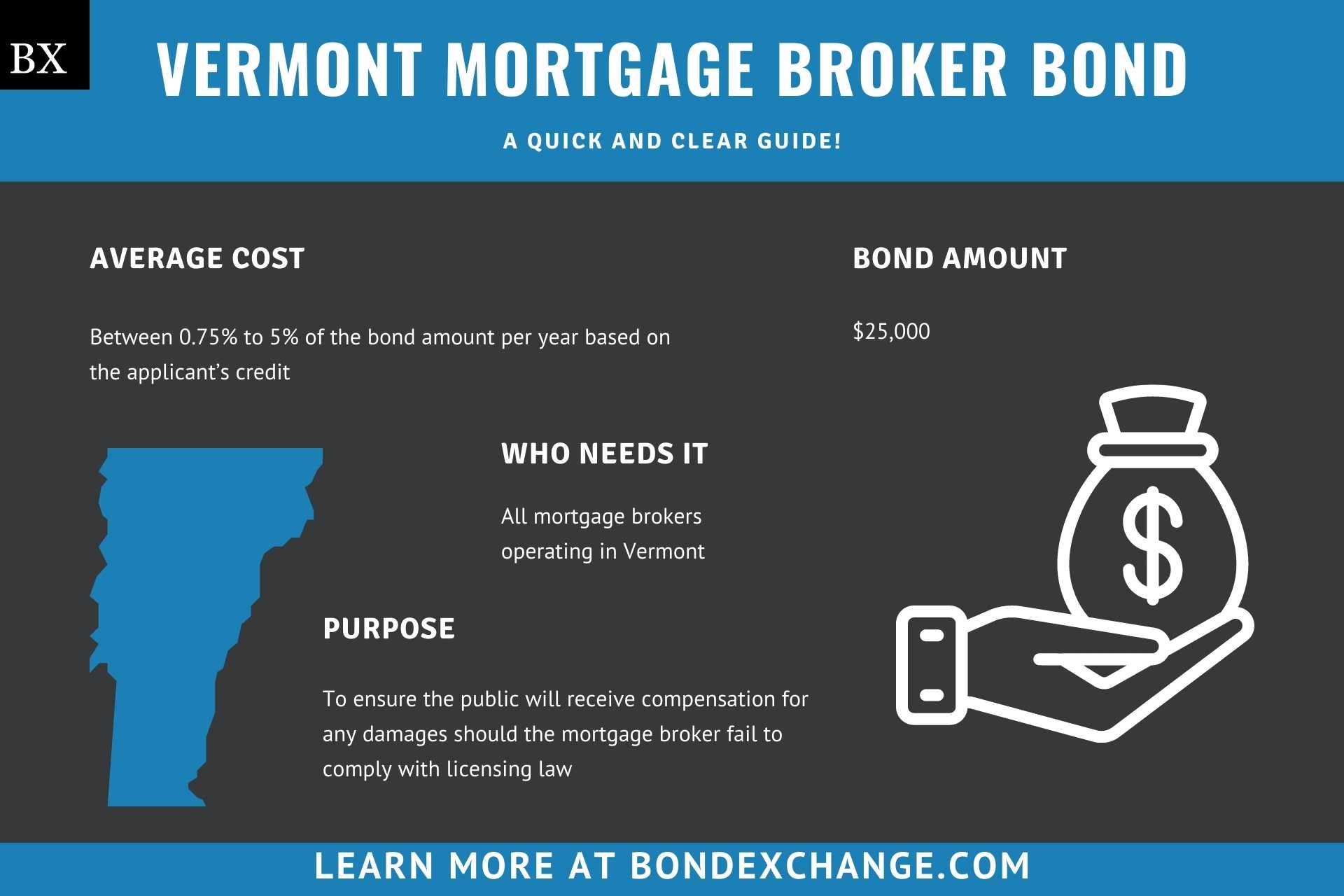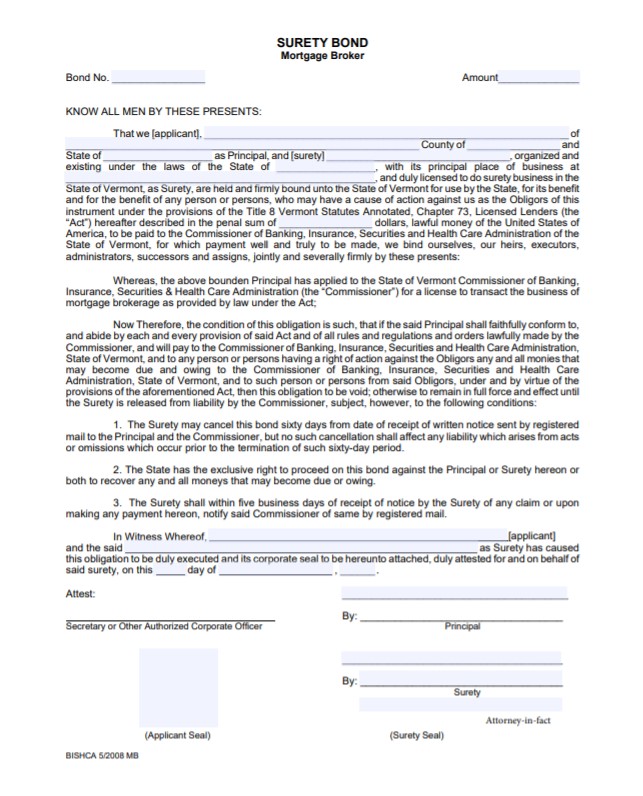Vermont Mortgage Broker Bond: A Comprehensive Guide
September 2, 2021

This guide provides information for insurance agents to help their customers obtain Vermont Mortgage Broker Bonds
At a Glance:
- Average Cost: Between 0.75% to 5% of the bond amount per year based on the applicant’s credit
- Bond Amount: $25,000
- Who Needs it: All mortgage brokers operating in Vermont
- Purpose: To ensure the public will receive compensation for any damages should the mortgage broker fail to comply with licensing law
- Who Regulates Mortgage Brokers In Vermont: The Vermont Department of Financial Regulation
Background
Vermont general law 8 V.S.A. § 2201 requires all mortgage brokers operating in the state to obtain a license with the Department of Financial Regulation. The Vermont legislature enacted the licensing laws and regulations to ensure that mortgage brokers engage in ethical business practices. To provide financial security for the enforcement of the licensing law, mortgage brokers must purchase and maintain a $25,000 surety bond to be eligible for licensure.
What is the Purpose of the Vermont Mortgage Broker Bond?
Vermont requires mortgage brokers to purchase a surety bond as part of the application process to obtain a business license. The bond ensures that the public will receive compensation for financial harm if the mortgage broker fails to comply with the licensing regulations outlined in Vermont general law Title 8 Chapter 73. Specifically, the bond protects the public in the event the broker engages in any acts of fraud or breaches any contracts made with consumers. In short, the bond is a type of insurance that protects the public if the mortgage broker breaks licensing laws.

How Can an Insurance Agent Obtain a Vermont Mortgage Broker Surety Bond?
BondExchange makes obtaining a Vermont Mortgage Broker Bond easy. Simply login to your account and use our keyword search to find the “mortgage” bond in our database. Don’t have a login? Enroll now and let us help you satisfy your customers’ needs. Our friendly underwriting staff is available by phone (800) 438-1162, email or chat from 7:30 AM to 7:00 PM EST to assist you.
At BondExchange, our 40 years of experience, leading technology, and access to markets ensures that we have the knowledge and resources to provide your clients with fast and friendly service whether obtaining quotes or issuing bonds.
How is the Bond Amount Determined?
Vermont general law 8 V.S.A. § 2203 (2) dictates that the limit on the mortgage broker bond is $25,000. The statute also grants the Department of Financial Regulation the authority to increase the bond amount, on a case by case basis, to a maximum of $100,000. The commissioner will examine the total amount of loans originated by the broker when determining whether to increase the bond amount.
Is a Credit Check Required for the Vermont Mortgage Broker Bond?
Surety companies will run a credit check on the owners of the mortgage company to determine eligibility and pricing for the Vermont Mortgage Broker Bond. Owners with excellent credit and work experience can expect to receive the best rates. Owners with poor credit may be declined by some surety companies or pay higher rates. The credit check is a “soft hit”, meaning that the credit check will not affect the owner’s credit.
How Much Does the Vermont Mortgage Broker Bond Cost?
The Vermont Mortgage Broker Surety Bond can cost anywhere between 0.75% to 5% of the bond amount per year. Insurance companies determine the rate based on several factors including your customer’s credit score and experience. The chart below offers a quick reference for the approximate bond cost on a $25,000 bond requirement.
$25,000 Mortgage Broker Bond Cost
| Credit Score | Bond Cost (1 year) |
|---|---|
| 700+ | $188 |
| 650 – 699 | $250 |
| 625 – 649 | $313 |
| 600 – 624 | $375 |
| 550 – 599 | $1,000 |
| 500 – 549 | $1,250 |
*The credit score ranges do not include other factors that may result in a change to the annual premium offered to your customers, including but not limited to, years of experience and underlying credit factors contained within the business owner’s credit report.
How Does Vermont Define “Mortgage Broker?”
Vermont statute 2200 defines a mortgage broker as any business entity who negotiates, places, or finds a mortgage loan for others.
Exceptions to this definition include:
- Real estate brokers and salespersons
- Licensed attorneys
How do Mortgage Brokers Apply for a License in Vermont?
Mortgage brokers in Vermont must navigate several steps to secure their license. Below are the general guidelines, but applicants should refer to the NMLS’s application guidelines for details on the process.
License Period – The Vermont Mortgage Broker License expires on December 31 of each year and must be renewed before the expiration date
Step 1 – Purchase a Surety Bond
Mortgage brokers must purchase and maintain a $25,000 surety bond
Step 2 – Hire a Qualifying Individual
Applicants for the Vermont Mortgage Broker License must employ a qualified individual who is capable of managing the day-to-day operations of the mortgage brokering business. The qualifying individual must be employed in a management position at the applicant’s main office location.
Step 3 – Request an NMLS Account
The Vermont Mortgage Broker License application is submitted electronically through the Nationwide Multistate Licensing System (NMLS). To submit a license application, applicants must first request to obtain an NMLS account.
Step 4 – Complete the Application
All Vermont Mortgage Broker License applications can be completed online through the NMLS. Applicants must complete the entire application, and submit the following items:
-
- Company financial statements
- The following company contacts:
- Primary
- Primary consumer complaint
- Exam delivery
- Pre-Exam
- Account information for the company’s letter/line(s) of credit, operating, and/or trust primary bank account(s)
- Disclosure questions
- Company business plan containing the following information:
- Marketing strategies
- Products & services
- Target markets
- Fee schedule
- Operating structure
- Certificate of Good Standing
- Company’s financial privacy policy
- The following document samples:
- Gramm-Leach-Bliley privacy notice
- Agreements used with prospective borrowers
- Company formation documents
- Company management and organizational charts
- Trust account authorization
The following items must be emailed to DFR.NMLS1@vermont.gov
-
- Financial statements for all company owners with an ownership stake of 10% or more
- Individual criminal background check requirements
- Home state licensure
Mortgage brokers must pay the following fees when submitting their license application:
-
- $500 license fee
- $500 application fee
- $100 NMLS processing fee
- $36.25 background check fee (per person)
- $15 credit report fee (per person)
How Do Vermont Mortgage Brokers Renew Their License?
Mortgage brokers can renew their licenses online through the NMLS. License holders need to simply login to their account to access their renewal application. The Vermont Mortgage Broker License expires on December 31 of each year and must be renewed before the expiration date.
What Are the Insurance Requirements for the Vermont Mortgage Broker License?
The State of Vermont does not require mortgage brokers to obtain any form of liability insurance as a prerequisite to obtaining a business license. Mortgage brokers must purchase and maintain a $25,000 surety bond.
How Do Vermont Mortgage Brokers File Their Bond?
Mortgage brokers should submit the completed bond form, including the power of attorney, electronically through the NMLS. The surety bond requires signatures from both the surety company that issues the bond and a representative from the mortgage company. The surety company should include the following information on the bond form:
- Legal name and address of entity/individual(s) buying the bond
- Surety company’s name and state of incorporation
- Bond amount
- Date the bond is signed
What Can Vermont Mortgage Brokers Do to Avoid Claims Against Their Bond?
To avoid claims on their bond, mortgage brokers in Vermont must follow all license regulations in the state, including some of the most important issues below that, tend to cause claims:
- Do not engage in any acts of fraud
- Do not breach any contracts made with consumers
What Other Insurance Products Can Agents Offer Mortgage Brokers in Vermont?
Vermont does not require mortgage brokers to purchase any form of liability insurance as a prerequisite to obtaining a license. However, most reputable businesses will seek to obtain this insurance anyway. Bonds are our only business at BondExchange, so we do not issue liability insurance, but our agents often utilize brokers for this specific line of business. A list of brokers in this space can be found here.
How Can Insurance Agents Prospect for Vermont Mortgage Broker Customers?
The NMLS conveniently provides a public database to search for active mortgage brokers in Vermont. The database can be accessed here. Contact BondExchange for additional marketing resources. Agents can also leverage our print-mail relationships for discounted mailing services.

